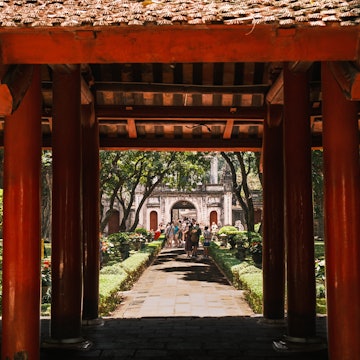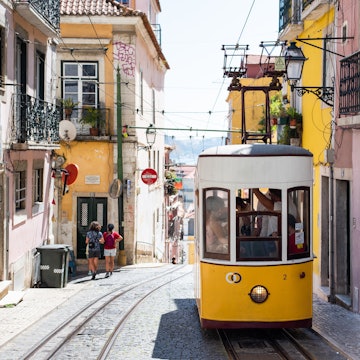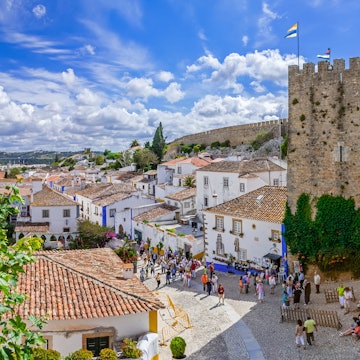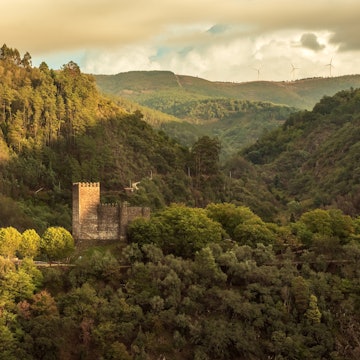
Plan the ultimate Algarve itinerary for sun, surf and culture

Jun 13, 2022 • 9 min read

Make the most of your time in the Algarve with these itineraries © FJ Jimenez / Getty Images
The Algarve is justly famed for its beaches and reliably good weather (300 sunny days per year!). And while visitors can’t be faulted for wanting to bask on captivating shorelines, there’s much more to Portugal’s southernmost region than sun and sand.
Cobblestone village centers, Roman ruins and nature reserves packed with unique plant and animal life are among the Algarve’s many attractions. Beyond the beach, you can walk clifftop trails, wander through medieval castles or get off the beaten track in tiny mountain hamlets in the interior. Of course, there’s plenty to do on and off the water, from kayaking amid dramatic coastal formations to wreck-diving across artificial reefs. Here are a few different itineraries to help you make the most of your trip to the Algarve.
Essential Algarve on a 3-day getaway
The Algarve’s relatively small size means you can pack a lot into a condensed trip. On a long weekend, you can bask on some of the Algarve’s prettiest beaches, see hidden grottoes on a boat trip and dine at some outstanding traditional restaurants.
Day 1: Explore Faro’s old center, then spend the day on an island
Make the most of your time by flying into Faro, which has direct flights to the UK, Ireland, Germany and France, plus frequent daily connections to Lisbon. On day one, take a morning stroll along the cobblestone streets of the Old Town, stopping for a peek inside the city’s grand cathedral. Nearby, you can have a coffee on the terrace of O Castelo overlooking the waterfront. Later that day, catch a ferry out to Ilha da Barreta, a sand-covered island just off the coast. Book ahead for a meal at environmentally friendly Estaminé, the best (and only!) restaurant on the island.
Day 2: Go beach-hopping west of Faro
You can make the drive from Faro to Lagos in about an hour, but it’s well worth stretching out the journey for a leisurely day of visiting the beaches and seaside communities along the way. West of Albufeira, you can take the steps down to Praia da Marinha, a lovely stretch of sand backed by dramatic cliffs. Further west, find the tunnel leading you down to Praia do Carvalho, a scenic cove once used by smugglers. Arrive in Lagos before sundown and have dinner at A Forja, a traditional tavern serving up deliciously authentic fare.
Day 3: Get out on the water in Lagos
Rise early for a boating and dolphin-watching excursion with outfitters like Bom Dia. They’ll take you out to grottoes and coastal rock formations accessible only by sea. Afterward, enjoy a bit of downtime at one of the small, secluded beaches near Lagos such as Praia da Balança. On your last evening, celebrate the trip over drinks on the rooftop of Bon Vivant, which serves up some of the best cocktails in the Algarve.

Land and sea adventures on a 5-day trip
The Algarve’s sun-kissed beaches make a fine backdrop to a wide array of outdoor activities. With five days to spare, you can undertake some lovely coastal walks, go kayaking or surfing, and sneak in a bit of wildlife watching.
Day 1: Ride the waves off Carrapateira
The northern coast of the Algarve just above Sagres has some of Portugal’s best waves. Located on the headlands overlooking the beach, the small community of Carrapateira makes a great base for visiting the region. Spend the day playing in the water – you can hire boards, take lessons or even bunk for the night at Amado, one of several recommended surf camps in the area.
Day 2: Go from summit to sea on a mountain bike ride near Praia da Luz
Around 25km (15.5mi) southeast of Carrapateira, you’ll find the small seaside community of Praia da Luz. Here you can connect with Mountain Bike Adventure, which leads various excursions in the rugged terrain nearby. You can ride the gravel paths on the cliffs above the crashing waves, race along a single track through the Barao Valleys or make the 40km (25mi) summit-to-sea descent going from highland terrain to the edge of the Atlantic. For DIY adventures, you can hire high-performance bicycles at Bica Bikes next door.
Day 3: Paddle your way through grottoes near Lagos
Just east of Praia da Luz, Lagos is the epicenter for all manner of first-rate aquatic activities, including kayaking. You can head off on a memorable half-day paddling trip with Kayak Adventures, which will take you to remote beaches, grottoes and striking rock formations along the coast. The easy-going trip begins and ends at Batata Beach, a short stroll from the old center of Lagos. Afterward, enjoy some downtime (or more action in the water) at nearby Meia Praia, a long sandy beachfront reachable on foot or by small ferry from Lagos.
Day 4: Walk the sea cliff trail near Carvoeiro
Take a break from the water on your fourth day, with a scenic walk along the Seven Hanging Valleys. This 6km (3.7mi) one-way trail follows the shoreline, sometimes taking you up to cliffs with lofty viewpoints, and at other times leading you right down to the water’s edge. Begin the trail at Praia do Vale de Centeanes, located about 35km (22mi) east of Lagos. At the end of the walk, you can enjoy a refreshing swim off Praia da Marinha, ranked one of Portugal’s prettiest beaches.
Day 5: Immerse yourself in undersea wonders on a diving trip off Albufeira
The Algarve is home to some of Europe’s best diving with a range of destinations, from shallow water (5m/16ft) for novices to deeper sites (40m/131ft) for those with more experience. Highlights include natural reefs, wall dives, wrecks, and artificial reefs, including the marine sanctuary of Ocean Revival Park. While you’ll find operators all along the coast, Easy Divers earns high marks for its well-run dives, and you can also take certification courses or book a snorkeling trip if you prefer not to plunge into the deep end. You’ll find them and Indigo Divers – another recommended outfitter – in Albufeira, around 60km (37mi) east of Lagos.
Nature, history and culture on a 7-day journey across the Algarve
On a longer trip, you can get a deeper appreciation of the Algarve’s many unique facets, from cinematic clifftops high above the crashing waves to hidden historical treasures dating back to the ancient Romans.
Day 1: Look for wildlife in the Algarve’s west coast nature reserve
The best way to approach the area is to hire a car from Lisbon and make the drive down the coast. Less than three hours after departing the Portuguese capital, you’ll arrive at the Parque Natural do Sudoeste Alentejano e Costa Vicentina, a nature reserve that protects the west coast of the Alentejo and the Algarve. Here you can connect to Portugal’s wild side on coastal walks like the 11km (6.8mi) loop hike of Pontal do Carrapateira. Keep an eye out for otters, foxes and some 200 bird species, including Portugal’s last remaining osprey population. Access the hike and some photogenic beaches in the village of Carrapateira. The Casa Bamboo makes an ideal overnight base for exploring.

Day 2: Peer off the edge of the world at Cabo de São Vicente
Keep motoring southwest and you’ll run out of road at Cabo de São Vicente. There’s a barren, end-of-the-world feel amid the cliff-top views from Europe’s southwesternmost point. The nearby village of Sagres is equally fascinating. You can explore Portuguese history at the Fortaleza de Sagres, a 15th-century fortress atop a rocky promontory, where according to legend, Prince Henry the Navigator headquartered his maritime academy. Afterward, stop in Three Little Birds for creative cooking and craft beers.
Day 3: See a little-visited town going strong for over 2000 years
From Sagres, drive 55km (34mi) east to reach Portimão, which has been a commercial center since well before the Romans arrived. You can learn about Portugal’s fishing industry at the Museu de Portimão, a former cannery transformed into an interactive museum. You can also take boat trips up the Rio Arade or down the coast (keep an eye out for dolphins). Though Portimão lacks ocean views, you can enjoy some beach time at nearby Praia da Rocha, a wide swath of seafront backed by ochre-red cliffs.
Day 4: Enjoy the lofty views from the mountain village of Monchique
Algarve’s coastline gets all the attention, but there’s a fascinating world just inland. From Portimão, head 25km (15.5mi) straight north to Monchique. Surrounded by forested slopes, this tiny mountain hamlet with its quaint guesthouses and rustic taverns makes a stark contrast to the Algarve’s sunbaked resort towns. You can take some rugged walks, including a 10km (6.2mi) circuit through the hills above town. After all that exertion, go for a soak in the hot springs of Caldas de Monchique.
Day 5: Drive the back lanes of the Serra do Caldeirão
Continue your tour of the hinterlands, with a scenic drive through the Serra do Caldeirão, a region of hills, cork trees and undulating forests. Stop in the picturesque village of Alte for a stroll past fountains and cafes dotting the cobblestone lanes. On hot days, join locals at their favorite swimming hole, a pond beneath the Queda do Vigário waterfall on the edge of town. Before heading back to the coast, visit Silves, which is home to the best-preserved castle in the Algarve. Unique lodging options make for a memorable overnight. Get your fill of the countryside at the organic farm and guesthouse Quinta da Figuerinha. You can also eat well at wine-loving spots like O Barradas.
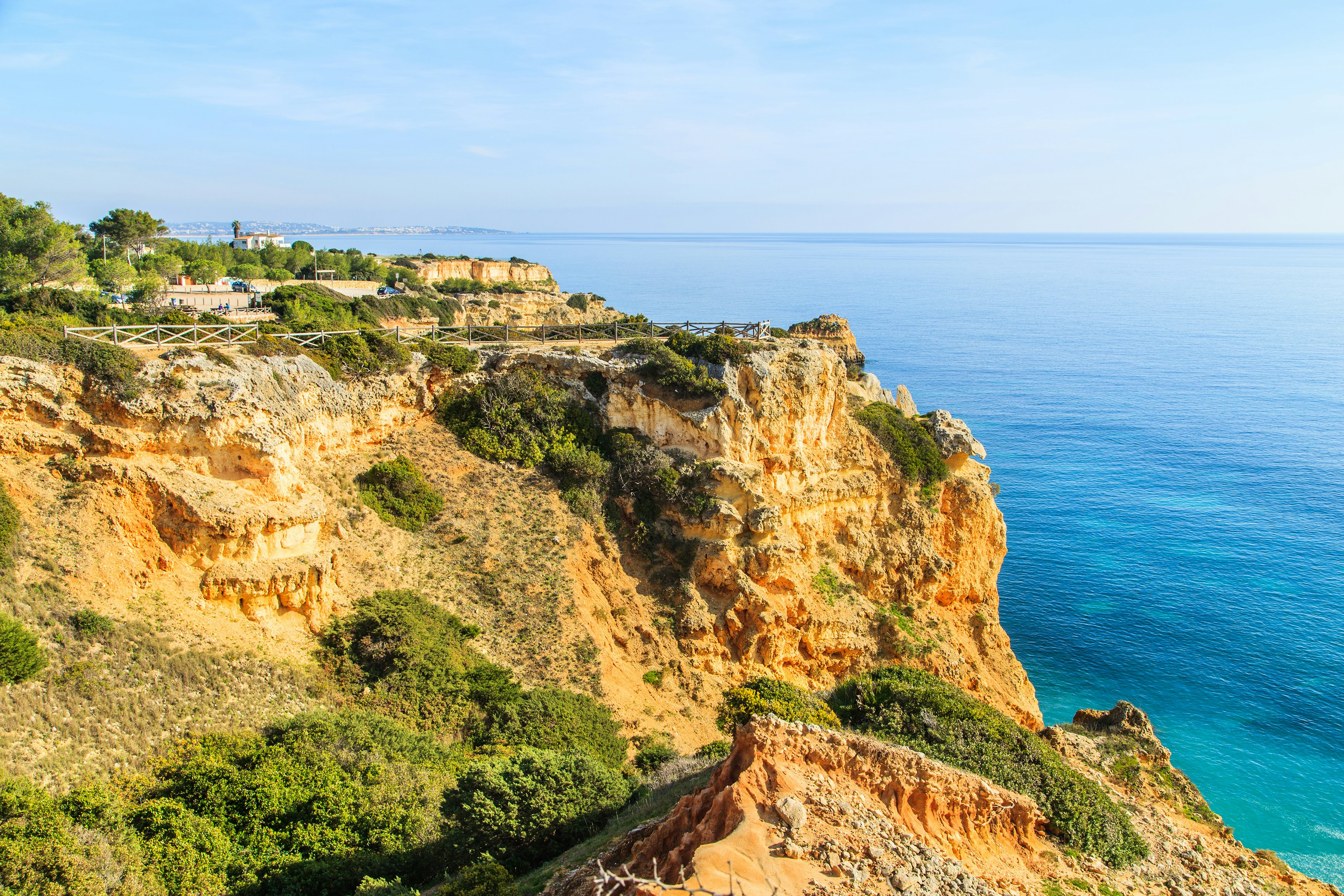
Day 6: Look for rare birds and Roman mosaics near Faro
Whether you come down from Alte or Silves, it’s less than an hour’s drive back to Faro near the coast. Head out early for a trip through the Parque Natural da Ria Formosa, a swath of protected wetlands and a vital habitat for white storks, rare purple gallinules and numerous other bird species. Eco-minded Formosamar runs some of the best boat trips. In the afternoon, take in the impressive Roman ruins at Milreu, a sprawling 1st century CE villa located 10km (6.2mi) north of town.
Day 7: Explore the Algarve’s most photogenic streetscapes in Tavira
A further 40km (25mi) east along the coast and you’ll reach riverside Tavira, one of the Algarve’s loveliest towns. Take in the historic architecture around the old quarter and the views from the ruined castle above the town, then treat yourself to a meal of Algarvian classics (like the chargrilled octopus) at Ti Maria. If time allows, squeeze in a trip out to Ilha de Tavira, a sandy island reached by ferry from Quatro Águas, just outside of Tavira.
Take your Portugal trip with Lonely Planet Journeys
Time to book that trip to Portugal
Lonely Planet Journeys takes you there with fully customizable trips to top destinations–all crafted by our local experts.













